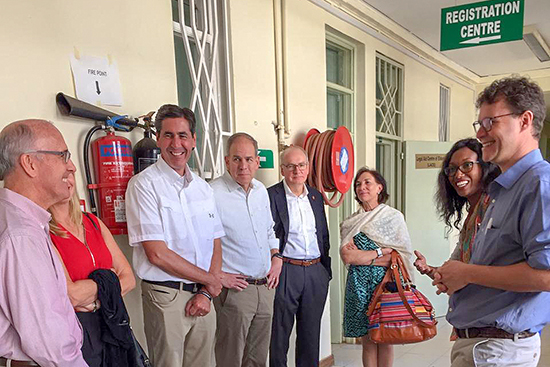In late 2019, a group of healthcare and industry leaders from central Indiana visited the AMPATH partnership in Eldoret, Kenya, not to teach, but to learn. The examples of innovation, collaboration, and mutual trust and respect they experienced informed their leadership approach when they returned. They shared their key insights during a recent AMPATH Fireside Chat.
“We believe very strongly that lessons learned in one place can be shared to improve the lives of people in another,” said Adrian Gardner, MD, MPH, executive director of the AMPATH Consortium and director of the IU Center for Global Health. “Diversity in experiences and perspectives can help us create innovative models of care delivered in various settings throughout the world. We term this ‘reciprocal innovation’ and our panel today is bringing this idea home to organizations they lead in Indiana after visiting AMPATH,” he continued.
IU School of Medicine Dean Jay Hess, MD, PhD, reflected on several trips to Eldoret and the community of purpose that he always experiences. “It's remarkable how resourceful the people in AMPATH and their colleagues in MTRH (Moi Teaching and Referral Hospital) and Moi University are. They just don't take no for an answer,” he said. “You can't visit Kenya without being transformed. I think that sense of purpose, the recognition of every contribution that people make, and that resourcefulness is incredibly inspirational. It’s something I won't soon forget.”
IU Health President and CEO Dennis Murphy remarked that it was hard to imagine that just six months after returning from Eldoret that they saw their first COVID patient. “And really, I think for IU Health, we took a lot of those lessons to heart. And maybe the first is one that we struggle with regularly--which is, do you let perfect get in the way of good? I think a lesson in Eldoret was do as much good for as many people as possible, as quickly as possible.” He added that this perspective helped to inform the IU Health response to COVID-19.
Reflecting on the uniqueness of the partnership, Tom Easterday, JD, said, “I would add the willingness to listen and to learn and to share best practices despite what could be cultural differences that would prohibit that. Having worked in an atmosphere where you have different cultures involved in the automotive industry, and sometimes that does create barriers, but I didn't see the barriers. The medical professionals in Kenya were outstanding and those from the United States and the AMPATH program work very closely with them without cultural barriers. I think that's critical,” added Easterday, executive advisor to North American Subaru and former senior executive vice president and CLO of Subaru of Indiana.
Scott Davison, chairman, president and CEO of OneAmerica, recalled visiting the newborn intensive care unit (NICU) at the Riley Mother and Baby Hospital in Eldoret. The NICU was built for 50 babies and was caring for 200 on the day the group visited. “So the nurses were innovating on the spot, very quickly, as to how they were going to be able to take the least sick baby babies and move them to another floor where they had more room,” he recalled. “The urgency was obviously driven by the fact that plan B would be to send babies home with their parents to die or otherwise have a bad clinical outcome. It was something I brought back to my team as, when plan B is that babies are going to die, you learn to innovate very quickly.“
Dr. Gardner asked the panelists, who all serve on the IU Health board of directors, how they respond to people who question why engaging in global health is important when there are tremendous needs, inequalities and challenges in Indiana.
“I think if we have gone through a pandemic and don't appreciate the importance of global health, we've missed it. I mean, we have to be concerned about the well-being of the entire world, even for selfish reasons,” said Dr. Hess, adding that he was impacted by how relatively modest investments can make such a difference in people’s lives.
“Once you're over there and you develop relationships with people, it's impossible to care for them any less than you would for people here in Indianapolis,” added Davison.
Watch the Fireside Chat to hear more insights and reflections from the central Indiana leaders.



